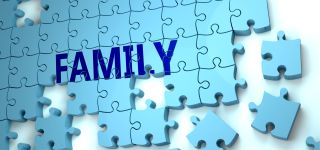Family Dynamics
Parents of Donor-Conceived People
Researching the thoughts and feelings of biological and non-biological parents.
Posted June 12, 2023 Reviewed by Kaja Perina
Key points
- Much is known about the common experiences of parents of donor-conceived people.
- There are some unique perspectives of single mothers, LGBTQ+, and heterosexual parents.
- Donor families that include a non-biological parent face unique challenges.
- Knowing where and who one comes from is essential in the formation of a donor-conceived child's identity.
There are common themes that arise with parents of donor-conceived people (DCP). Since 2000 more than 86,000 DCP, egg and sperm contributors (donors), and parents have been sharing their thoughts, experiences, and stories on the Donor Sibling Registry website, its Facebook group chat, and via many research studies.

Published research and voluminous anecdotal accounts offer common experiences of the parents of DCP.1,3
- Feelings of joy and gratitude for being able to become a parent.
- Grief/sadness/shame over infertility: unresolved infertility grief is all too often passed along to the child as shame in the form of secrecy. Ideally, healing work in this area would be done before a donor-conceived person is born or as soon afterward as possible.
- Worry about their own or their partner’s lack of a genetic connection with a child; sadness or fear over what that means for their current/future family.
- Worry about how accurate the donor or the gamete vendor was with the information they shared. Most gamete brokers provide a medical sheet that is a self-reported snapshot of one day in the life of a healthy young donor, with medical updates rarely asked for or accepted and shared with families.
- Guilt about the fact that their donor child doesn't have information about their ancestry, family medical history, or close genetic relatives. Some parents use this as an excuse for not telling their children the truth about their conception.
- Managing privacy/secrecy issues and the desire to hide the use of a donor: keeping such a big secret from everyone is a lot of work and can be exhausting. Secrecy implies shame.
- Single mothers by choice (they purchase ~50% of all sperm) may feel shame about not having a partner. Sometimes, parents use the desire for “privacy” to mask the unrealized embarrassment of being single.
- Single mothers by choice may be feeling overwhelmed and may not have a sufficient support system as a solo parent.
- Worry that other children will tease their child because of the difference in their family. Modeling conversations so that the donor child is secure and confident about sharing their origin story is crucial.
- Trying to decide if, how, and when to tell their child and others (eg., family members/friends/doctors) about using a donor and fearing the DCP's reaction to the news, especially if older. Worry about their child potentially finding out via a commercial DNA test.
- Lying by omission: If disclosing to an older DCP, parents can feel worried about the anger that their child might have towards them for not being told the truth sooner or about having had to find out on their own. This is another common reason for non-disclosure.
- Fear of possible discord in a marriage/family if one parent wants to tell, or is open to exploring donor family connections and the other isn't.
- Worry about their child having an unmanageable number of half-siblings.
- Issues with managing a changing or evolving experience of “family" and deciding how best to include family and friends in the journey.
- Potential contact worries: Will their family be negatively affected by making contact with their child’s donor family members? How to best prepare themselves and/or their children for feelings of rejection or a change in group dynamics.
- Wondering about how to incorporate new parents or adult donor siblings into an already existing group of half-siblings, some of whom are minors? Parents can be inclusive (not exclusive) when a half-sibling group is expanding and work with their kids to create that soft landing pad for new arrivals.
- Feeling joy and gratitude in regard to the connections made with their child's biological donor family. Many parents of DCP's half-siblings create deep bonds with each other and expand the family to include each other.
- Debate about the legal and emotional issues that might present themselves if using a known donor, (a friend, family member, or stranger).
LGBTQ+ Parents
In the early decades of donor insemination, many clinics, doctors, and facilities did not allow LGBTQ+ people (or single women) to purchase gametes, but now approximately a third of parents buying sperm are LGBTQ+ people.1 These parents of donor children, like most heterosexual parents, raise their kids in emotionally rich and stable environments. Children in LGBTQ+ families are often acquainted early on with the knowledge and belief in tolerance and diversity. LGBTQ+ families can, however, have unique stresses including in healthcare, schools, and with legal parentage issues. The non-biological LGBTQ+ parent is not always properly acknowledged and can face discrimination or feel like they are being dismissed.
Counselors, families, schools, medical professionals, and support systems can convey ease, acceptance, inclusive language, and terminology to provide LGBTQ+ parents with inclusive and welcoming words and policies.
The Non-Biological Parent
Many people who are considering having a child face the possibility/probability of not being genetically related to that child. Whether they’re a man, woman, or couple dealing with infertility or a genetic issue that makes it impossible to have a biological child, or they’re an LGBTQ+ couple, and they choose to use donor gametes, someone in their family equation will be in the position of being the non-bio parent.2 It is crucial for these parents to feel secure in their parenthood.
Many non-biological parents who have utilized donor gametes have not been adequately counseled or educated before using donor conception to create their families. It is vital that these parents deal with any loss, grief, or shame that they may have around their own infertility, work through any emotions they might be experiencing from the lack of biological connection, and educate themselves about the needs and issues their child might have, ideally before a child is born.
Unfortunately, many parents still try to withhold the truth from their children to protect the non-biological parent. Family secrets can be toxic, and parents, who expect honesty from their children, certainly owe their children the same. In families with secrets, all too often the “secret” hovers just beneath the surface, creating distance between non-biological parents and their donor children. The DCP can be unsure why there is a feeling of distance between them and their non-biological parent. This disconnect can have life-long negative consequences.
Parents who do disclose the truth can still pass along their insecurities and fears. It is often the non-biological parent that feels more insecure about their parentage, and the child can be affected by this insecurity2. Never speaking about it again, or giving the child the clear message that it's an uncomfortable subject can have significant repercussions for the child and for the whole family dynamic. Not making peace with their lack of biological connection may create discourse and guilt within the child when any natural feelings of curiosity arise within them.
These issues can arise for both heterosexual and LGBTQ+ families. The non-biological parent may minimize the contribution of the donor, which could be harmful to a donor-conceived child trying to construct their identity and acknowledge all contributors. Sometimes the non-bio parent is afraid of their child reaching out to half-siblings and/or their donor, and therefore they make preemptive statements such as “biology doesn’t make a family.”
These parents’ unresolved discomfort or sadness about not having a genetic connection to their child can cause great instability and insecurity within their nuclear family. Often this is expressed as disappointment or anger at a curious child, causing the child to then feel a great sense of betrayal even just thinking about the unknown people they are genetically related to. This can be paralyzing to the DCP who have a longing or desire to explore connections with their unknown relatives and actually make efforts to do so.
Nature and Nurture
DCP are deeply influenced by the parents that love and raise them and also by the parents that contribute ~50% of their DNA. Exploring what it means to be a parent (both a noun and a verb) and understanding that their children are a wonderful blend of both nature and nurture can lead to honest, grounded, and loving relationships. Respecting the fact that knowing where and who one comes from is likely an essential ingredient in the formation of a donor-conceived child’s current and future identity is vital for a stable and healthy family.
References
1. Sawyer, N., Blyth, E. Kramer, W., & Frith, L. (2013). A survey of 1700 women who formed their families using donor spermatozoa. Reproductive Biomedicine Online, 27, 436-447, DOI: 10.1016/j.rbmo.2013.07.009
2. Widbom, A., Isaksson, S., Sydsjö, G., Svanberg, A., S., Lampic, C. (2021). Positioning the donor in a new landscape-mothers' and fathers' experiences as their adult children obtained information about the identity-release sperm donor. Human Reproduction, 38, 2181-2188. doi: 10.1093/humrep/deab146.




